Corinne Day was a self-taught photographer that grew into a fashion photography legend. Known for her intimate and candid portraits and anti-fashion approach to fashion photography, her work has pushed boundaries and paddled against the flow of fashion industry norms. Read more about the photographer who's work helped coin the nickname 'herion chic' below...


Corinne Day is a revolutionary figure in the world of fashion photography, transformed the industry by challenging traditional norms and introducing a raw, anti-fashion aesthetic. Born on in 1962 in West Sussex, Day's journey to becoming an anti-fashion anti-establishment fashion photographer was marked by a rejection of conventional beauty standards and a commitment to authenticity.
Day's career began in the late 1980s, a period dominated by the polished and glamorous images of supermodels. However, her approach stood in stark contrast to the prevalent fashion photography of the time. Day's breakthrough came with her collaboration with the well known British magazine, The Face, which provided a platform for her to explore her vision. Her work captured the spirit of a new London generation and reflected the grunge and DIY ethos that defined the era. Her candid documentary-style approach to image making captured honest, sometimes provocative, and sometimes biographical portraits of the people around her at the time, including big names in fashion like Kate Moss and Tara St Hill. Corinne began to define that '90s DIY look and feel that rejected the airbrushed imagines of mainstream glossy magazines.

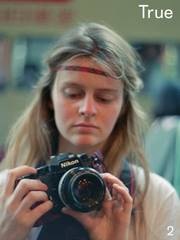
What set Corinne apart from a lot of other photographers at that time was her willingness to defy established norms. She was not interested in idealised beauty; instead, she sought to capture the raw and unfiltered essence of her subjects. This approach was evident in her work with Kate Moss, whom she discovered at the age of 15. Day's images of Moss challenged the prevailing notions of model perfection, showcasing a natural, almost mundane, beauty that resonated with audiences. Unknowingly at the time, it's what launched Kate Moss' very long, successful and revered career.
Corinne's photographic style was characterised by its rejection of conventional glamour and its embrace of imperfections. Her photographs often featured minimal makeup, disheveled hair, and an absence of retouching – a big point of different from the highly polished images that dominated fashion magazines at the time. Day captured the vulnerability and authenticity of her subjects, inviting viewers to see beauty beyond the conventional standards and adding grit to the glamour of fashion photography.
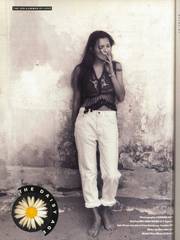
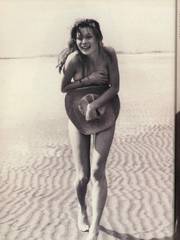
The controversial "The 3rd Summer of Love" editorial for The Face magazine in 1990 marked a turning point in Corinne's career. Featuring a then un-known 16-year-old Kate Moss, dubbed 'a cocky kid from Croydon', who was about to explode on the London modelling scene. A series of candid and documentary-style images looking fresh, fun and care-free, shot at a grey looking Camber Sands, the editorial received some mixed reactions. Some praised the authenticity and realness it brought to fashion photography, while others criticised it for deviating too far from established norms. Regardless, it solidified Corinne's reputation as a trailblazer who was unafraid to challenge the norm and push boundaries.
Corinne continued trailblazing as an anti-fashion fashion photographer, Her June 1993 Vogue UK shoot is a notable example. A young and quite fresh-faced Kate Moss is seen in lingerie, looking natural, more girl-next-door than overly sexualised. Minimal clothing, underwear, and Kate's skinny physique contributed to the shoot being dubbed 'heroin chic', a term you still hear thrown around today. This rolled out into a scandal that caused both Corinne and Kate's careers to suffer momentarily, and the media labelled Kate as a 'junkie'. Regardless of opinion, it has to be said that this was a landmark moment for fashion photography. The shoot captured a vulnerability so foreign to a fashion magazine, at that time at least; the images transcend the trends they were meant to be showcasing. Corinne later commented that the shoot took place a day after Kate had been crying after a fight with her then-boyfriend, which explains the look of vulnerability and sensitivity captured (check the Christmas lights photo, one of the iconic and controversial images produced in the '90s). Kate Moss has since gone on to star on the cover of Vogue more than anybody else in history.
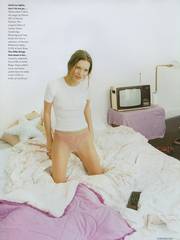
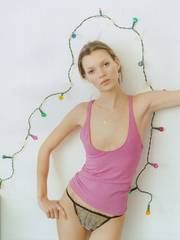
Corinne's anti-fashion stance extended beyond her photography to her personal life. She was known for her candid and outspoken views on the fashion industry, often criticising its obsession with youth and perfection. Her uncompromising commitment to authenticity was both a professional and personal statement, making her a symbol of resistance against the glossy and sugar coated illusion of the fashion world.
Corinne Day's journey to becoming an anti-fashion fashion photographer was marked by a rebellious spirit and a commitment to authenticity. Her work with Kate Moss and groundbreaking editorials for The Face challenged the established norms of glamour, paving the way for a more diverse and inclusive representation of beauty in the fashion industry. Day's impact is felt to this day, as her legacy continues to inspire a new generation of photographers to question, challenge, and redefine the boundaries of conventional beauty in the world of fashion.
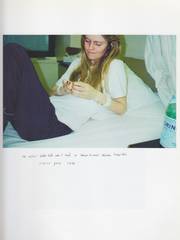
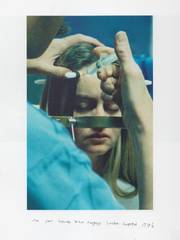
Corinne Day passed away August 2010 in London a the age of 45. Her first brain tumour was discovered in New York in 1996, she underwent surgery to remove the tumour and it was successful. The brain tumour returned in 2008, and after two years of battling brain cancer, Corinne died. Throughout her life and beyond her death Corinne has inspired a new generation of image makers in fashion and documentary photography via her realistic and honest depictions of life and contributions to youth culture. Corinne's influence can be seen in the work of contemporary photographers who continue to challenge conventional beauty standards and celebrate the authenticity she championed.








































































































